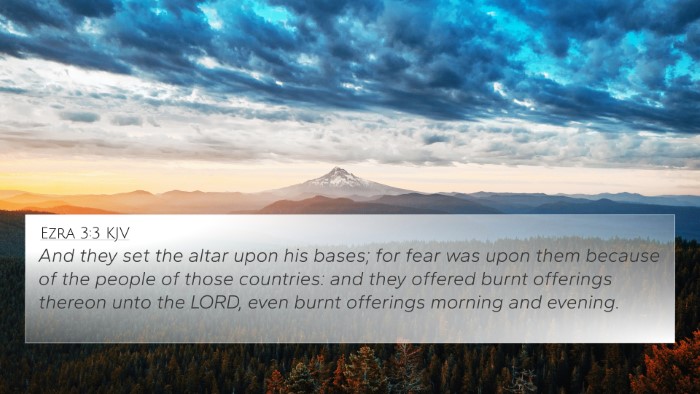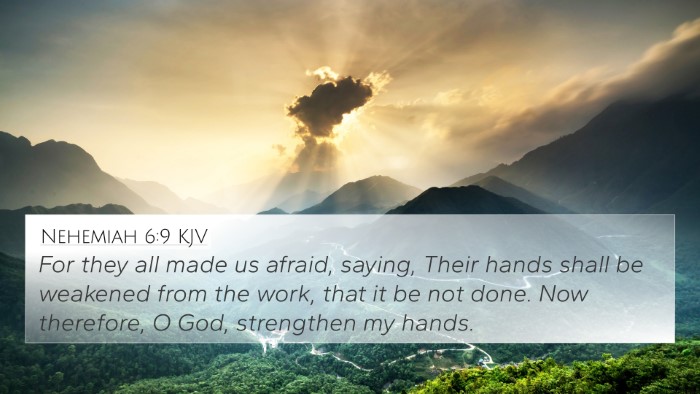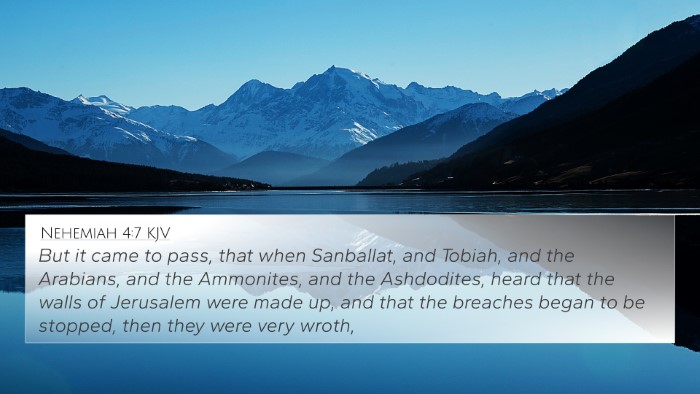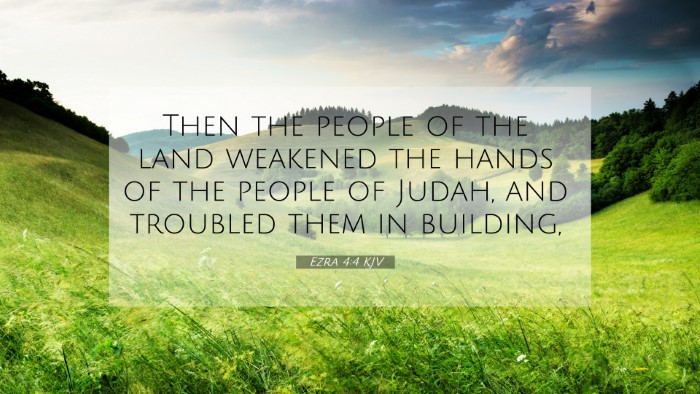Old Testament
Genesis Exodus Leviticus Numbers Deuteronomy Joshua Judges Ruth 1 Samuel 2 Samuel 1 Kings 2 Kings 1 Chronicles 2 Chronicles Ezra Nehemiah Esther Job Psalms Proverbs Ecclesiastes Song of Solomon Isaiah Jeremiah Lamentations Ezekiel Daniel Hosea Joel Amos Obadiah Jonah Micah Nahum Habakkuk Zephaniah Haggai Zechariah MalachiEzra 4:4 Similar Verses
Ezra 4:4 Cross References
Then the people of the land weakened the hands of the people of Judah, and troubled them in building,
Uncover the Rich Themes and Topics of This Bible Verse
Listed below are the Bible themes associated with Ezra 4:4. We invite you to explore each theme to gain deeper insights into the Scriptures.
Ezra 4:4 Cross Reference Verses
This section features a detailed cross-reference designed to enrich your understanding of the Scriptures. Below, you will find carefully selected verses that echo the themes and teachings related to Ezra 4:4 KJV. Click on any image to explore detailed analyses of related Bible verses and uncover deeper theological insights.

Ezra 3:3 (KJV) »
And they set the altar upon his bases; for fear was upon them because of the people of those countries: and they offered burnt offerings thereon unto the LORD, even burnt offerings morning and evening.

Nehemiah 6:9 (KJV) »
For they all made us afraid, saying, Their hands shall be weakened from the work, that it be not done. Now therefore, O God, strengthen my hands.

Jeremiah 38:4 (KJV) »
Therefore the princes said unto the king, We beseech thee, let this man be put to death: for thus he weakeneth the hands of the men of war that remain in this city, and the hands of all the people, in speaking such words unto them: for this man seeketh not the welfare of this people, but the hurt.

Nehemiah 4:7 (KJV) »
But it came to pass, that when Sanballat, and Tobiah, and the Arabians, and the Ammonites, and the Ashdodites, heard that the walls of Jerusalem were made up, and that the breaches began to be stopped, then they were very wroth,

Nehemiah 4:11 (KJV) »
And our adversaries said, They shall not know, neither see, till we come in the midst among them, and slay them, and cause the work to cease.
Ezra 4:4 Verse Analysis and Similar Verses
Understanding Ezra 4:4
Verse: "Then the people of the land weakened the hands of the people of Judah, and troubled them in building."
Overview: Ezra 4:4 highlights the challenges faced by the Jews during their efforts to rebuild the temple in Jerusalem. This verse emphasizes external opposition and the impact of discouragement on the faithful.
Insights from Public Domain Commentaries
This verse has been interpreted through various lenses by scholars such as Matthew Henry, Albert Barnes, and Adam Clarke, all of whom offer valuable insights into its meaning.
Commentary Highlights
- Matthew Henry: Henry notes that the opposition faced by the Jewish people came not only in the form of discouragement but also through direct interference in their efforts. He elaborates on how such opposition is often a tactic used by the adversary to hinder God's work.
- Albert Barnes: Barnes highlights the significance of the term "weakened" in this context, pointing out that the adversaries sought to demoralize the workmen of Judah, emphasizing the psychological aspect of their struggle. He also underscores the importance of perseverance in faith despite external challenges.
- Adam Clarke: Clarke provides a socio-political context to the situation, explaining how the local inhabitants aimed to intimidate the Jews and disrupt their unity in faith and purpose. He suggests that such tactics have been prevalent in biblical narratives, reflecting a recurring theme throughout scripture.
Thematic Connections
The struggles illustrated in Ezra 4:4 foster thematic connections that resonate throughout the Bible. The following themes and related verses further illuminate the spiritual implications of facing opposition:
- Opposition to God's Work: Nehemiah 4:1-3 - Nehemiah faced similar ridicule and threats when rebuilding the walls of Jerusalem.
- Endurance in Trials: James 1:2-4 - Encouragement to consider trials as joy, leading to perseverance.
- Spiritual Warfare: Ephesians 6:12 - Our struggles are not against flesh and blood, but against spiritual forces.
- Encouragement from God: Isaiah 41:10 - Assurance that God is with us and will strengthen us amid fears.
- Historical Parallels: Luke 10:3 - The disciples were sent as lambs among wolves, indicating expected opposition.
- Faith Amidst Adversity: Psalm 27:14 - Encourages waiting for the Lord and showing strength in times of trouble.
- God’s Promises During Trials: Romans 8:31 - If God is for us, who can be against us?
Cross-Referencing Biblical Texts
Cross-referencing biblical texts enriches the understanding of Ezra 4:4 and reveals how opposition in faith is a prominent theme throughout scripture. Below are some tools and methods for effective Bible cross-referencing.
Tools for Bible Cross-Referencing
- Bible Concordance: A tool that helps locate verses based on keywords.
- Cross-Reference Bible Study: A method involving closely analyzing verses that link thematically or contextually.
- Bible Reference Resources: Collections of verses and thematic studies related to various concepts within scripture.
- Bible Chain References: Structured links that guide readers through interconnected verses.
Finding Cross-References in the Bible
When seeking cross-references, consider these approaches:
- Use a Bible concordance to identify keywords related to your verse.
- Employ cross-reference systems available in many study Bibles.
- Engage in comprehensive Bible study methods where thematic links between verses are explored.
Conclusion
Ezra 4:4 serves as a poignant reminder of the challenges believers often face in the pursuit of fulfilling God’s calling. The insights from the commentaries and interconnections with other biblical passages enrich the understanding of resilience in faith and the nature of spiritual opposition. By utilizing effective cross-referencing tools, one can explore the intricate links between scriptural texts and better understand their theological implications.



